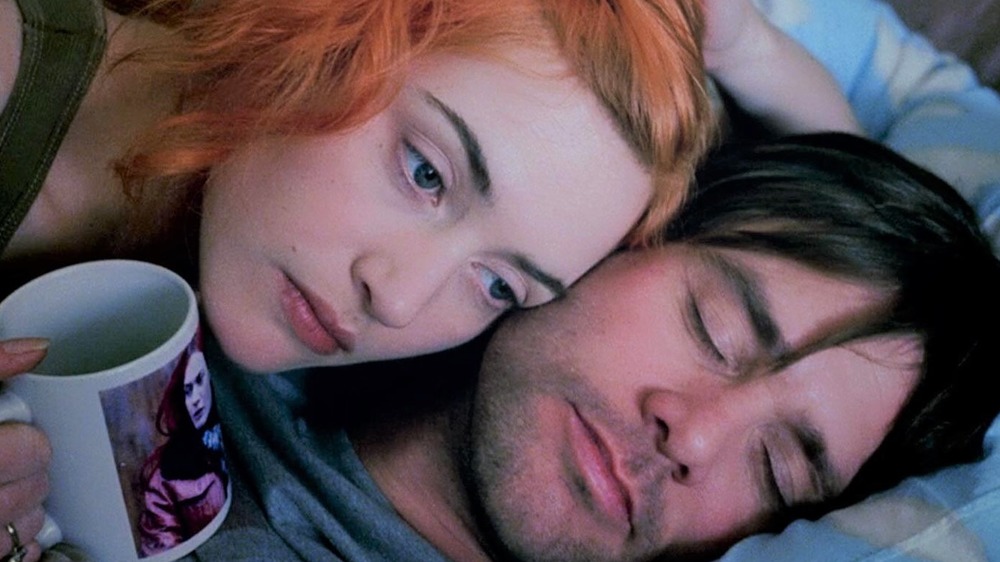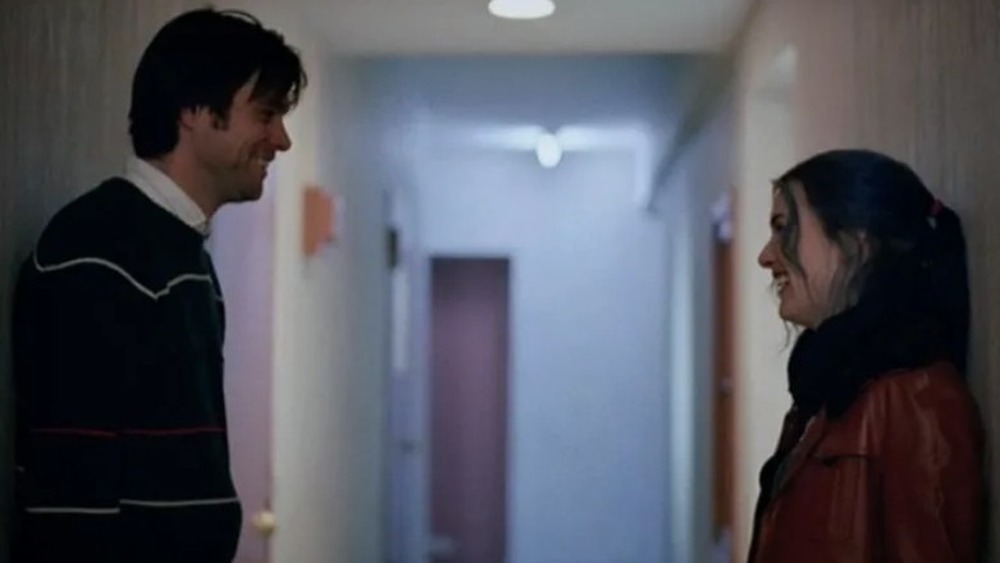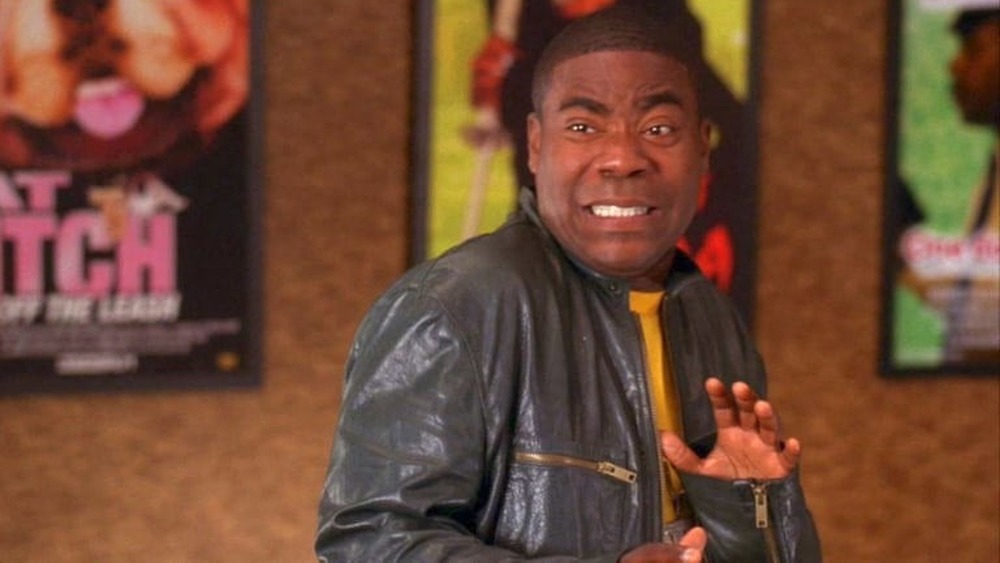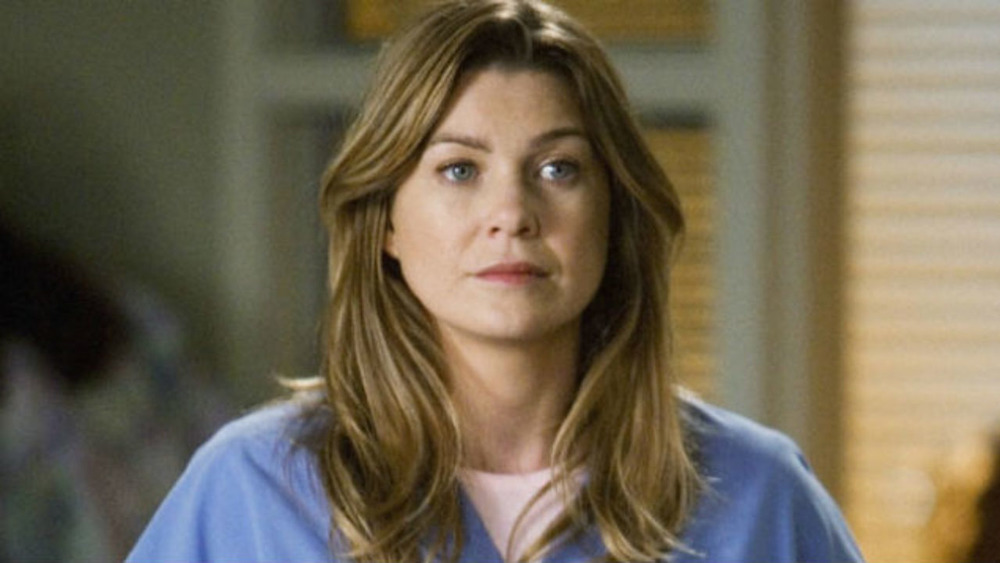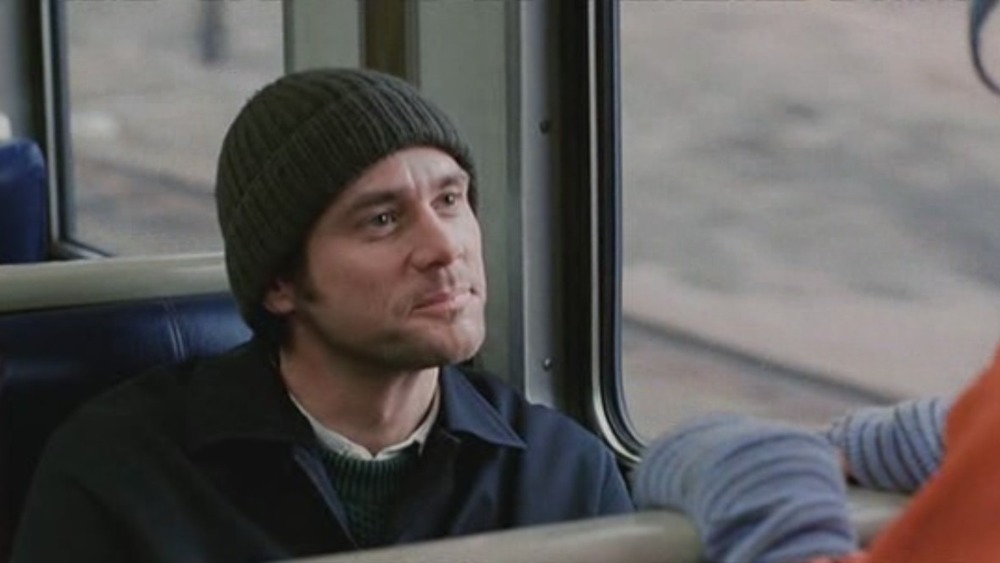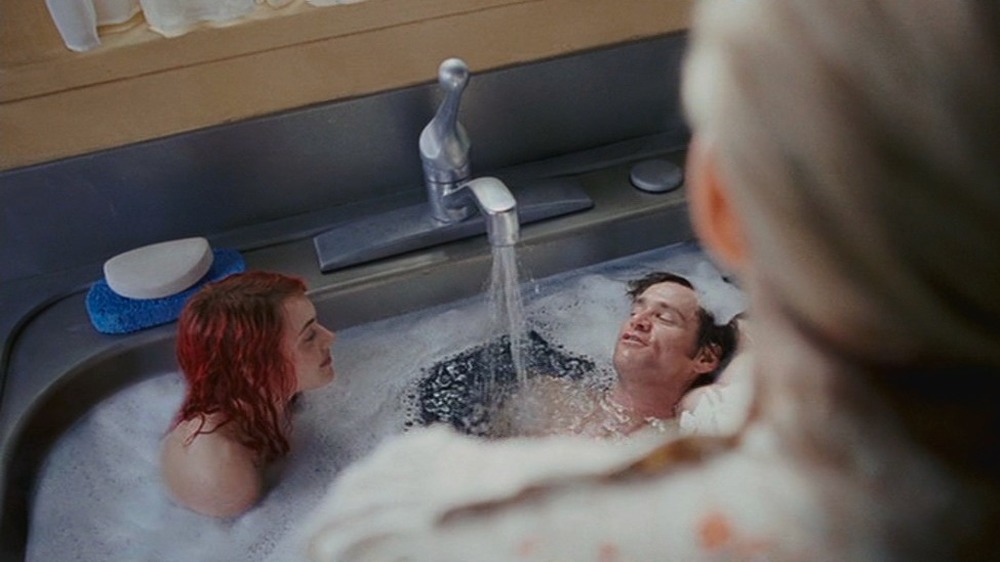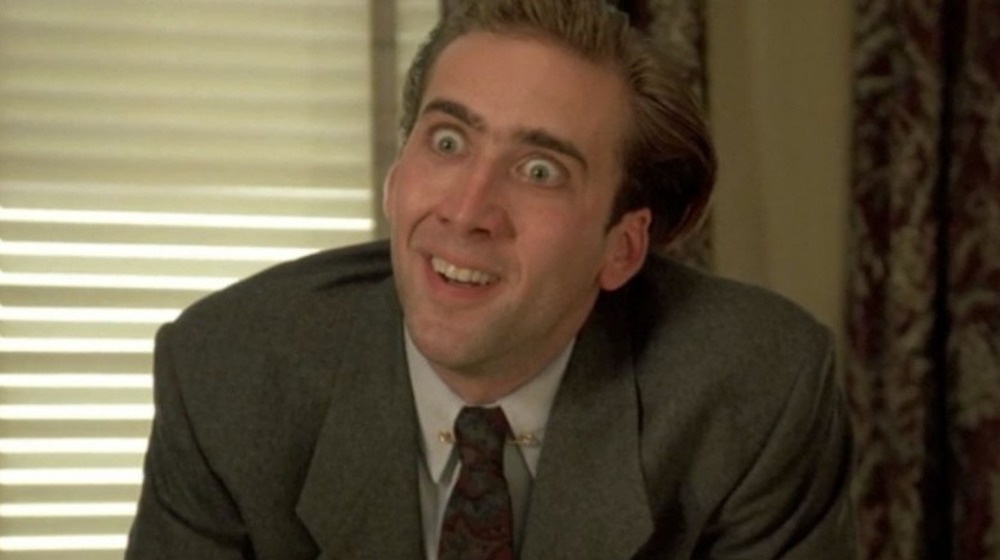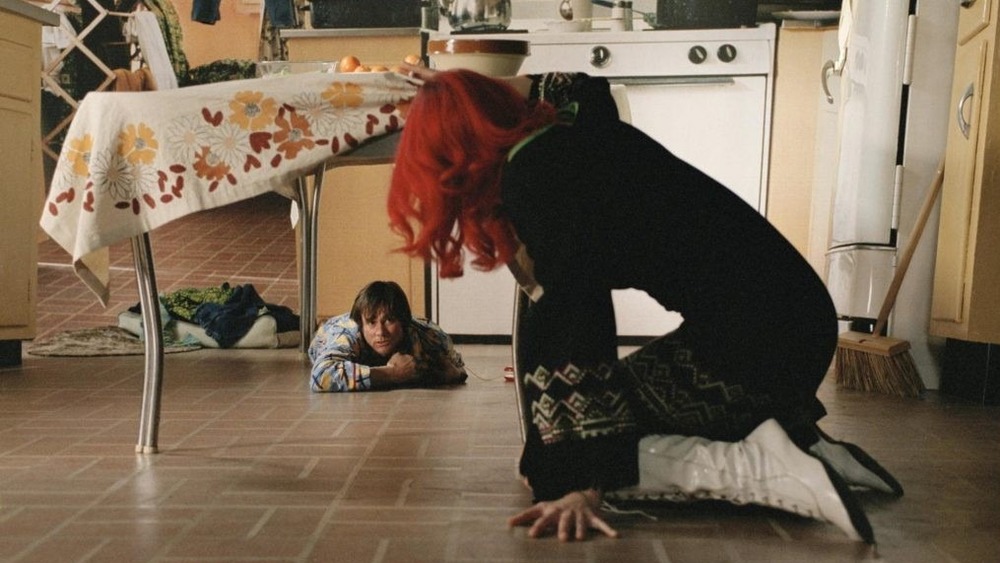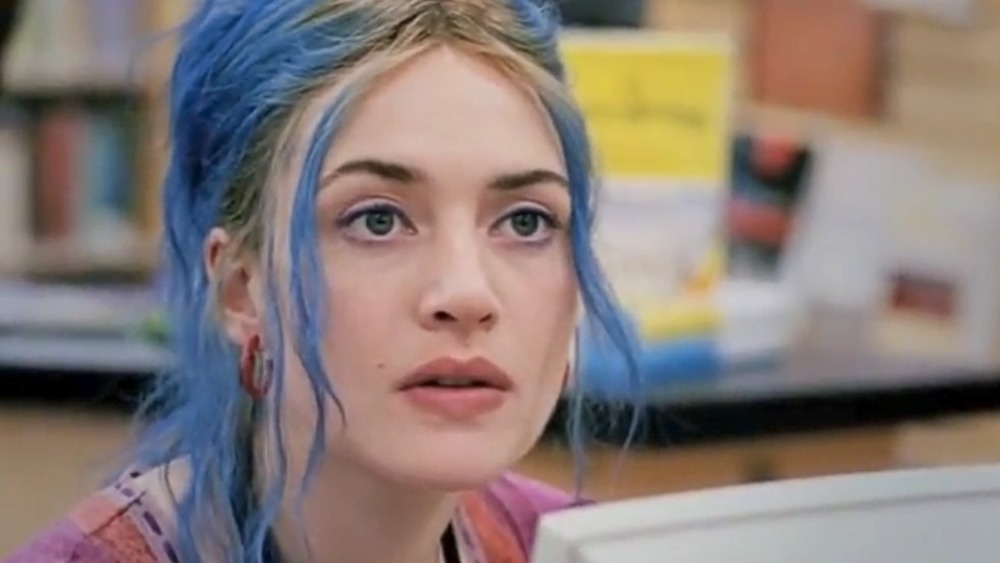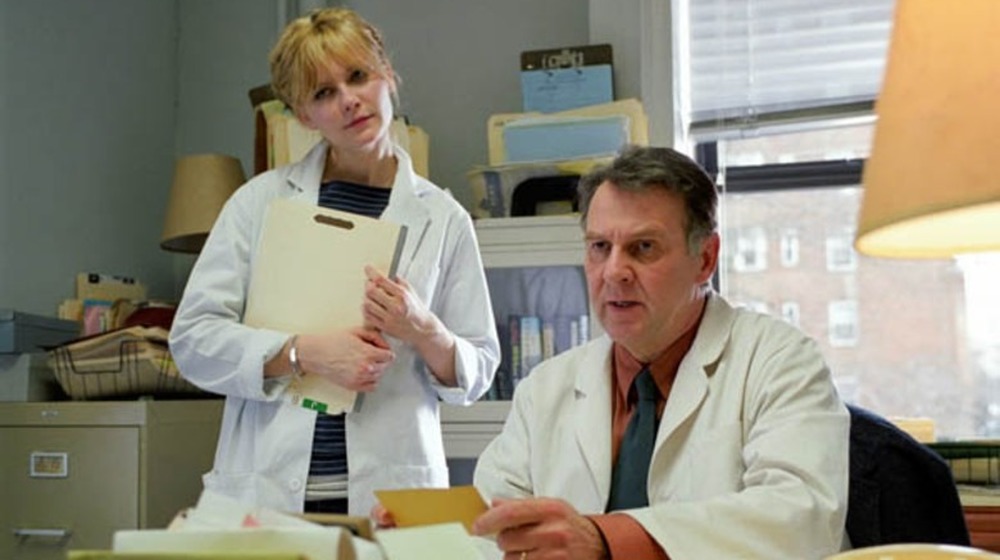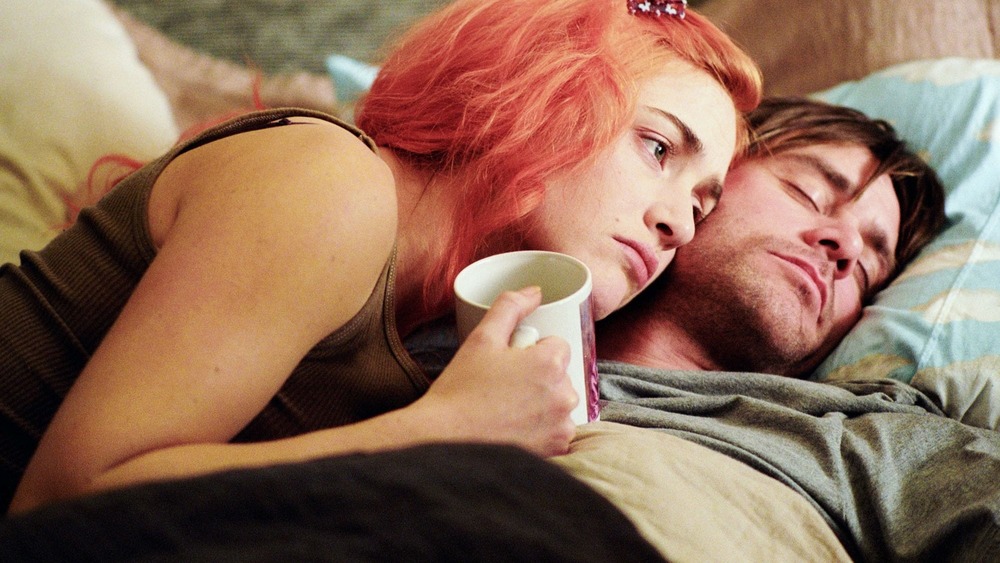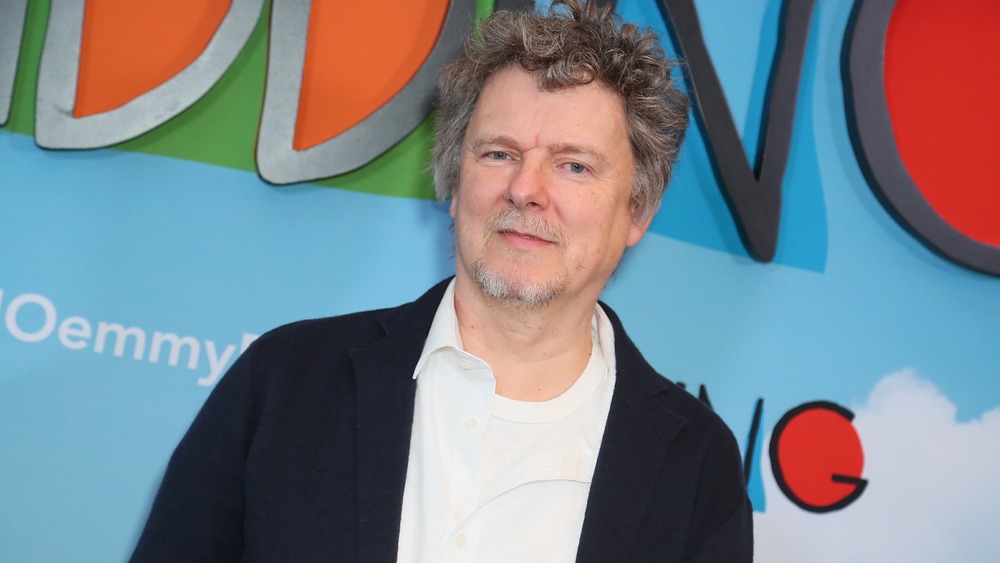The Untold Truth Of Eternal Sunshine Of The Spotless Mind
On his way to work, Joel Barish (Jim Carrey) impulsively skips his regular train and instead boards one for Montauk. On the freezing beach of the Long Island hamlet, Joel catches glimpses of a blue-haired woman. He sees her again in a diner where she spikes her own coffee with liquor, and later, she plays a flirtatious game of peek-a-boo with him. They finally speak to each other on the train, and while that early conversation gets rocky, Joel ends up in her apartment. Both are hours away from learning this isn't the first time they've met. In fact, it's not even the first time they've fallen in love.
So begins 2004's Eternal Sunshine of the Spotless Mind — an award-winning film about how romantic relationships can sour, how badly they can end, and how it's all worth it anyway. Written by Charlie Kaufman and directed by Michel Gondry, Eternal Sunshine of the Spotless Mind is a visually wild and dizzying film, an absolute heartbreaker, and a story that displays the impressive acting range of its male lead, Jim Carrey.
As great as the film is, making it wasn't all kittens and rainbows. To learn more about the heated battles behind the camera, controversial casting choices that didn't even make it to the screen, and directing strategies that made Gondry's actors want to smack him, keep reading for the untold truth of Eternal Sunshine of the Spotless Mind.
(Warning — there are spoilers below.)
Writer Charlie Kaufman had a different ending in mind for Eternal Sunshine of the Spotless Mind
Considering everything the characters go through, Eternal Sunshine enjoys a pretty happy ending. But apparently, that wasn't what screenwriter Charlie Kaufman wanted.
Around the first 18 minutes of Eternal Sunshine ends up being a fake-out. What appears to be the beginning of the story is actually much closer to the end. Joel and Clementine both receive packages revealing that while they believe they've just started dating, they've already shared a volatile relationship that ended with Clementine hiring Dr. Mierzwiak (Tom Wilkinson) to have her memories of Joel erased. Not long after, Joel followed her example.
Hearing audio tapes of each other describing the reasons for their respective mind-wipes doesn't bode well for a new relationship. Joel is initially convinced Clementine is pulling off an elaborate prank, and hearing Joel's tape angers Clementine, even though Joel can't remember saying any of it. Regardless, the pair end the movie willing to try to make it work, even though everything is telling them their relationship will crash and burn.
But this relatively happy ending wasn't Kaufman's idea. In a 2019 Vanity Fair interview with Jim Carrey and Michel Gondry, Carrey told the magazine, "We don't end up together in Charlie's version. I walk away." Neither Carrey nor Gondry go into specifics as to why the ending was changed, but considering what a gut-punch it would be to end this already emotional film on such a down note, it doesn't seem tough to speculate.
Tracy Morgan was almost in the movie ... maybe?
A couple of years before the comedian and actor started making gold out of parodying himself on NBC's 30 Rock, Tracy Morgan apparently was in a number of scenes for Eternal Sunshine of the Spotless Mind that wound up on the cutting room floor. According to Gondry, Morgan played Joel's neighbor and would've appeared in "a few flashbacks."
Telling Vanity Fair about the experience, both Gondry and Jim Carrey called Morgan "a comedic genius." Gondry, however, seemed to think his celebrity and big personality would've distracted from the story because "the reality is he was Tracy Morgan."
Vanity Fair reached out to Morgan's representation for comment, and the surprising response was that Morgan "doesn't remember if he acted in the film." It's a curious answer. On one hand, considering Morgan's sense of humor and the memory-wiping that takes place in the film, it could be that Morgan's answer was meant as a joke. On the other, Morgan has suffered some public humiliations because of alcohol abuse – including a pair of DUI arrests in 2005 and 2006 – so it's not out of the realm of possibility that he really doesn't remember.
Jim Carrey wasn't happy with a certain casting choice
In the theatrical version of Eternal Sunshine of the Spotless Mind, we briefly hear mention of Joel's ex-girlfriend, Naomi. Early in the movie, after spotting Clementine on the beach, he thinks to himself, "Maybe I should get back together with Naomi. She was nice. Nice is good. She loved me."
However, we never see Naomi. Nevertheless, Naomi was cast, and scenes were filmed with the character. Ellen Pompeo — best known as Dr. Meredith Grey on the medical drama Grey's Anatomy — plays Naomi in the deleted scenes, and according to Jim Carrey, the director chose her because he thought it would open some still fresh wounds.
Shortly before the filming of Eternal Sunshine, Carrey broke up with actress Renée Zellweger. That, Carrey says, is why Gondry chose Pompeo. "I was pretty hurt," Carrey told Vanity Fair. "Michel [Gondry] likes to have real feelings in the scene and real chemistry, so he hired Ellen Pompeo, who's a wonderful actress. But she reminded me completely of Renée. Her look was similar. ... And it ends up that she's not even in the movie."
For his part, Gondry says Carrey is imagining things. "I don't think they look alike," Gondry said during the same interview.
Gondry chose Carrey because he was alone in a crowd
It may seem impossible in retrospect to imagine Eternal Sunshine without Jim Carrey, but at the time, he was a surprising choice. Not only was Carrey known more for his comedy, but even the characters Carrey played in more dramatic films like The Truman Show and Man on the Moon tended to have big personalities. Barish, on the other hand, is an introvert. He's quiet, thoughtful, and often painfully shy. So how did Carrey spring to mind for the role?
Gondry told Vanity Fair he chose Carrey in part because he saw a much different side of the actor. Gondry used the example of when he visited the set of the 2003 comedy Bruce Almighty. Gondry said that in between takes, Carrey seemed a lot more like Joel Barish than he did Ace Ventura. "It's the exact feeling when you walk into a party, and you feel everybody knows each other but you," Gondry said. "I always saw Jim [Carrey] like that. Like he doesn't belong."
Carrey added that Gondry worried he was going to lose his male lead before filming started. He said Gondry correctly predicted his debut film, Human Nature, was going to flop once it was released in American theaters. So, at some point in 2002 before Human Nature's release, Gondry and Carrey were at a restaurant when the director made his male lead sign a napkin stating he wouldn't bail on Eternal Sunshine once Human Nature bombed. Thankfully, Carrey stuck to his cloth contract.
There wasn't always a lot of 'sunshine' on the set
In 2014, Gondry told The Daily Beast that Carrey was "very frustrated" during shooting, not only because the comedian had to go against his usual tendencies toward improvisation and comedy but because everyone else was getting to play in the sandbox he wasn't allowed in. The director brought up the example of scenes in which Kristen Dunst and Mark Ruffalo are dancing on the same bed where Carrey has to lie still. "[Carrey] said, 'Why are they improvising? You told me the opposite!'" Gondry remembered. "And I had to explain to him that it was different for his character."
Things got heated enough that while shooting a scene in which Joel remembers being bathed in a sink by his mother, Gondry thought the actor was going to take a swing at him. Sitting in a huge tub for hours took a toll on Kate Winslet, but Gondry didn't want to stop shooting. "Michel was going, 'Shoot, shoot!' and [Winslet] was going, 'I'm nauseous,'" Carrey told Vanity Fair. "And I got angry. ... So yeah, Michel and I had words."
Gondry added that during those "words," he actually asked his lead, "Are you going to punch me in the face?" We're assuming the answer was no.
A very different actor could've had the lead role
With the reputation the actor has since built for crazy performances, it's kind of shocking to learn that before Jim Carrey was tapped to play Joel Barish, the frontrunner for Eternal Sunshine of the Spotless Mind's male lead was none other than Nicolas Cage.
But as Michel Gondry explained to The Daily Beast, as strange as it may be to imagine Nicolas Cage shrinking from Clementine on the train from Montauk or making up constellations from the ice of the Charles River, it wasn't quite so strange a notion in the late '90s and early '00s. "We had approached Nicolas Cage a long time ago," Gondry recalled, "but every independent director who wanted to make a commercial movie asked Nicolas Cage to be in their movie after Leaving Las Vegas, except he would only do one out of ten of these projects."
The truth is if you look at Cage's entire body of work, he's no stranger to playing the kind of relatively meek, soft-spoken characters like Joel Barish. But a healthy amount of over-the-top characters and plenty of internet memes has just made it really, really tough for moviegoers to remember that.
In spite of its amazing visuals, Eternal Sunshine of the Spotless Mind used very little CGI
Eternal Sunshine of the Spotless Mind was made at a time when CGI was first being widely used in big-budget films. Peter Jackson's effects-heavy Lord of the Rings trilogy concluded the year before Eternal Sunshine's release, and a handful of different studios were releasing the pre-MCU Marvel superhero films, which likewise used plenty of digital enhancements.
While Eternal Sunshine doesn't have epic battles between supernatural forces like those other movies, it does have a lot of impressive visuals that you might think would be impossible without CGI. But as Kaia Placa pointed out in her 2017 essay for Film Independent, part of the reason Gondry's film endures so well is because the director favored practical effects whenever possible.
For example, in a scene when Joel retreats to a memory of himself as a toddler, one where Jim Carrey appears much smaller than Kate Winslet, forced perspective was used to create the illusion of a pint-sized Joel. In a scene in which Winslet appears to be impossibly disappearing from one room and reappearing in another, secret doors were built so that the actress could race in and out of the rooms off-camera. Toward the end of the film, when the beach house Joel and Clementine break into appears to be collapsing under the tide, it was no illusion. A house was actually built on the shore specifically so that the ocean tide would invade the space.
Kate Winslet stood out because she wasn't afraid to speak up
You might assume the best way to get a job is to act subservient. In some cases, that may be the way to go, but don't tell that to Kate Winslet. Gondry has said in a number of different interviews that one of the main reasons he picked Winslet out of the crowd was that she was the only actress up for the part of Clementine who read the Eternal Sunshine script and gave notes on it. Gondry told Vanity Fair in 2019, "I was really surprised by her honesty. Then I believed her when she said it was a great project."
Speaking to The Daily Beast five years earlier, the director got a little more specific about Winslet's criticisms of the early script. "She said that it was a little bit repetitive in some places, and we shouldn't shy away from being more sentimental," Gondry remembered. "She also said she was going to be just as big as Jim Carrey in the movie ... so Jim would have to tone his performance down."
Gondry went on to say he was so passionate about Winslet being the best choice that he threatened to leave the project. He said the studio wanted another actress and tried to force Gondry to fire Winslet after the other actress won an Oscar. "I said, 'No! If you want to switch, you can't force me or else I will leave.'" Thankfully for all of us, the studio didn't force the matter.
Tom Wilkinson had no idea what was going on
In spite of what different actors endured on the set of Eternal Sunshine of the Spotless Mind, from all accounts, no one in the cast was unhappier than Tom Wilkinson. The Oscar nominee played Dr. Mierzwiak, the same doctor who develops the bizarre memory-wiping procedure and who we eventually learn performed it on his own employee, Mary (Kristen Dunst). He pressures her into the decision after they end an illicit affair.
Talking with The Daily Beast in 2017, Mark Ruffalo — who plays Dr. Mierzwiak's assistant, Stan – said Wilkinson would often get frustrated with Gondry. Ruffalo recalled, "Tom Wilkinson kept being like, 'I don't know what the hell we're doing! I don't know what [Gondry's] doing!'" Ruffalo said when he told Wilkinson he thought the movie would be good, his English co-star responded, "'I don't dig any of it ... and I don't know what you're doing!' I was like, 'I don't know what I'm doing either, man. I hope it works!'"
Gondry's memory of Wilkinson is similar. The director told The Daily Beast that, for example, Wilkinson refused to do any more than three takes of any scene, but thankfully, "he was great in all three takes." Gondry also remembered Wilkinson's attitude making him question "everything at the roots" of his profession. "I'd give [Wilkinson] a direction, and he'd just look me right in the eye and say, 'Why?'" Gondry said. "I was petrified, and it left me wondering, 'Do I give him this direction?'"
Director Michel Gondry liked to keep everyone confused
While making Eternal Sunshine of the Spotless Mind, part of Gondry's creative genius (and part of what drove some of the actors a little batty) was his conscious effort to foster chaos. In particular, Gondry apparently abandoned one of the basic tools of film directing — he stopped saying "action."
In a 2004 interview with Hatchet, Gondry admitted, "I like to create a little confusion, a little panic, and then shoot the scene. I'd say, 'Okay, let's go now,' so that most actors wouldn't be ready for it. ... They just don't have the time to worry about what they want people to think they are; they just are."
In the same interview, Winslet said that without knowing whether or not Gondry was filming at any given time, she would often be confused about when she should stop using her natural English accent and switch to American "just in case (Gondry) was trying to grab something." Mark Ruffalo pointed out to The Daily Beast, "We were shooting 36,000 feet of film a day, which, even by the most excessive standards, is out of control. There were cameras rolling non-stop."
And sometimes Gondry would give one actor a direction without warning their costars. For example, Carrey told Vanity Fair that Gondry had Winslet punch him in the arm in an early scene without bothering to warn Carrey. "She gave me a pretty good wack!" Carrey said. "I immediately knew it was [Gondry]."
It took Gondry's own break-up to understand Eternal Sunshine of the Spotless Mind
In his interview with The Daily Beast, Gondry admitted to something a little surprising. He said it wasn't until the film was shot and in the editing process that he truly understood one specific part of it.
Gondry said his girlfriend broke up with him while he was editing Eternal Sunshine, and having to live through the break-up redeemed a scene in which Joel Barish gathers up Clementine's belongings and puts them in garbage bags. The director said he didn't like the scene at first, but his break-up changed his mind. "I thought, 'Oh, that's such a stereotype,' but when my girlfriend left me, I lived it!" Gondry said. "I had to put all my stuff in a cardboard box and send it back to Los Angeles, and I thought, 'Okay, now I understand what the movie was saying.'"
Gondry also said the break-up ruined the film for him in at least one sense. "I can't watch it anymore," Gondry confessed. "It makes me too sad."
